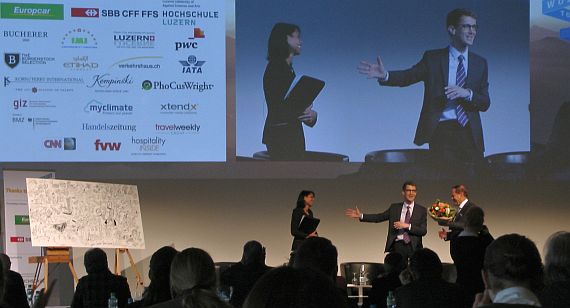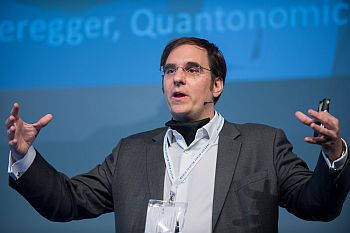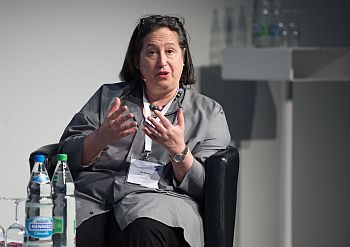WTFL Lucerne: IT trends from a global perspective - The start of the data war
 |
|
The third "World Tourism Forum" Lucerne focused on the global shift, on sustainability and talent management. Co-chair Reto Wittwer of Kempinski Hotels (on stage to the right) and organizer Professor Martin Barth thank moderator Anita Mendiratta. |
Lucerne (April 26, 2013). The figures sound phenomenal but they also entail risks: last year, there were one billion travellers worldwide for the first time; this year, it will already be 1.35 billion, and by 2050, it will be three billion! But how can these masses of people be reached in terms of marketing, how can they be guided on their travels, with which staff will they be served at the destinations and in the hotels? Last week, the 3rd "World Tourism Forum" in Lucerne (WTFL) provided food for thought on this matter. The daily routine of tourism will be influenced by three factors: internet technology, sustainability and shortage of talents. Here, an evaluation of the experts on IT: the linking of offline and online is increasing, the playful persuasion of the customer is top priority. The trend is shifting from an overflow of information to relevant information only. However, linking these pieces of information with other commercial models is still in the early stages of development. But the aim is clear.
"The opportunity offered by IT is a great system risk at the same time," stated Professor Ian Goldin, Director at Oxford Martin School University of Oxford. Michael Frenzel, Chairman of World Travel & Tourism Council (WTTC) said at the speaker's desk, "real experiences will become a status symbol in future." Is this a wrong world? In any case, everything is possible; therefore, it was comforting to see that even top-class speakers are not able to grasp the hyper-dynamics specifically, let alone predict them any further.
 |
|
| Lars Sonderegger: Our basis of life has changed. |
Instead, the rationally thinking manager could understand the change of paradigm better, which was described by Lars Sonderegger, Founder and CEO of the research business Quantonomics, specialised in neuron science. The digital age, which started in the nineteen eighties, changed the basis of life. Virtual networking changes the interaction of people amongst each other; it questions old habits, and creates new parameters, which Sonderegger summarised in four points:
• Inspire the people but don't force them!
• Relax and not try harder!
• Assume responsibility, less control!
• Belong to someone or something, think less in transactions!
Those who want to do successful business in the internet and with the internet have to change their way of thinking – as product-related ideas of growth have reached their limits. This was the statement of a data analyst, of all people. Carroll Rheem, Principal Analyst at data research company PhoCusWright: "Today, growth means stealing customers from others!" Why otherwise do price portals link up with search engines in the meantime?
In future, it will no longer be important who filters the bookings but who influences them! Who is going to fill the funnel to the customer? Knowing the customer exactly will be the task; however, every individual entrepreneur/hotelier has to ask himself if he really knows his competition.
Specific data and specific persuasions
"The new currency is computer data!", said Carrol Rheem in conclusion. "Other than fighting over data, what is the sense in Google and Facebook competing with one another?", asked the data analyst. On the product level, the data fight will be decided on the "mobile" level in future; all speakers agreed on that.
 |
|
| Nathan Clapton: TripAdvisor also experiments with sophisticating Apps. |
The playful persuasion of the customer takes place via smart phones, apps and mobile websites. For this purpose, you catch the user in his drive for individualisation: first examples from Scandinavia persuade the user to "overlap" his own photos with motives of the northern lights, for example. Augmented reality makes it possible. Or descriptions of places of interest can be downloaded at home in advance already during the planning of trips; this corresponding information can then be accessed at the destination offline. This saves download costs in foreign countries.
This way, a tempting bridge from online to offline is created. Today's resulting advice for providers: everyone – not just hotels – should no longer solely provide descriptive information online but also content, which can be actively used by the user.
Since 2011, TripAdvisor USA has been experimenting with an app called "Near me now". Through the GPS connection, the user can find information about the nearest restaurant at the destination, for example, and a sensor shows pedestrians the right direction. By the way, Nathan Clapton, Vice President Mobile Partnerships at TripAdvisor, found out that users spend twice as much time with this kind of app than on mobile websites. In the meantime, the TripAdvisor app has been downloaded 31 million times – a significant number...
Gaining relevant information
Apparently, there seems to be an emerging trend that really relevant pieces of information for the user are being taken into consideration. And immediately, the first agencies join the trend: Kit Simon, Global Chief Revenue Officer at Adara Media, represented a business, which provides information about destinations during and after the booking process, and then tries to place targeted advertising. "Through the bookings, we know the preferences of the travellers," she said, "but the data are still too small for real utilisation. However, the aim is clear: real-time data of travellers will become the great capital, as it is the access to the customer and might encourage the consumption of the advertised product.
 |
|
| Kit Simon: Out of the data flood only relevant data will count in future. |
TripAdvisor's representative Nathan Clapton summarises the data obsession much more soberly: "We have 'wisdom of friends', 'wisdom of the crowd', sources like Google and much more; however, the decisive question is how high the respective conversions from this data are?" But there are still no specific statements concerning these conversion rates. However, this will only be a matter of time.
Even if not all subjects at WTFL were new, it was still interesting to hear what others think about the online trend on a superior and global level. The WTFL, which welcomed 400 representatives from 65 countries this year, wants to become the "WEF of Tourism" – an intellectual panel, which debates the global course tourism is taking. You were able to count the participants from the hotel industry on two hands. / Maria Puetz-Willems
To print this article you have to be registered and logged in for newsletter, visitor or subscription.





